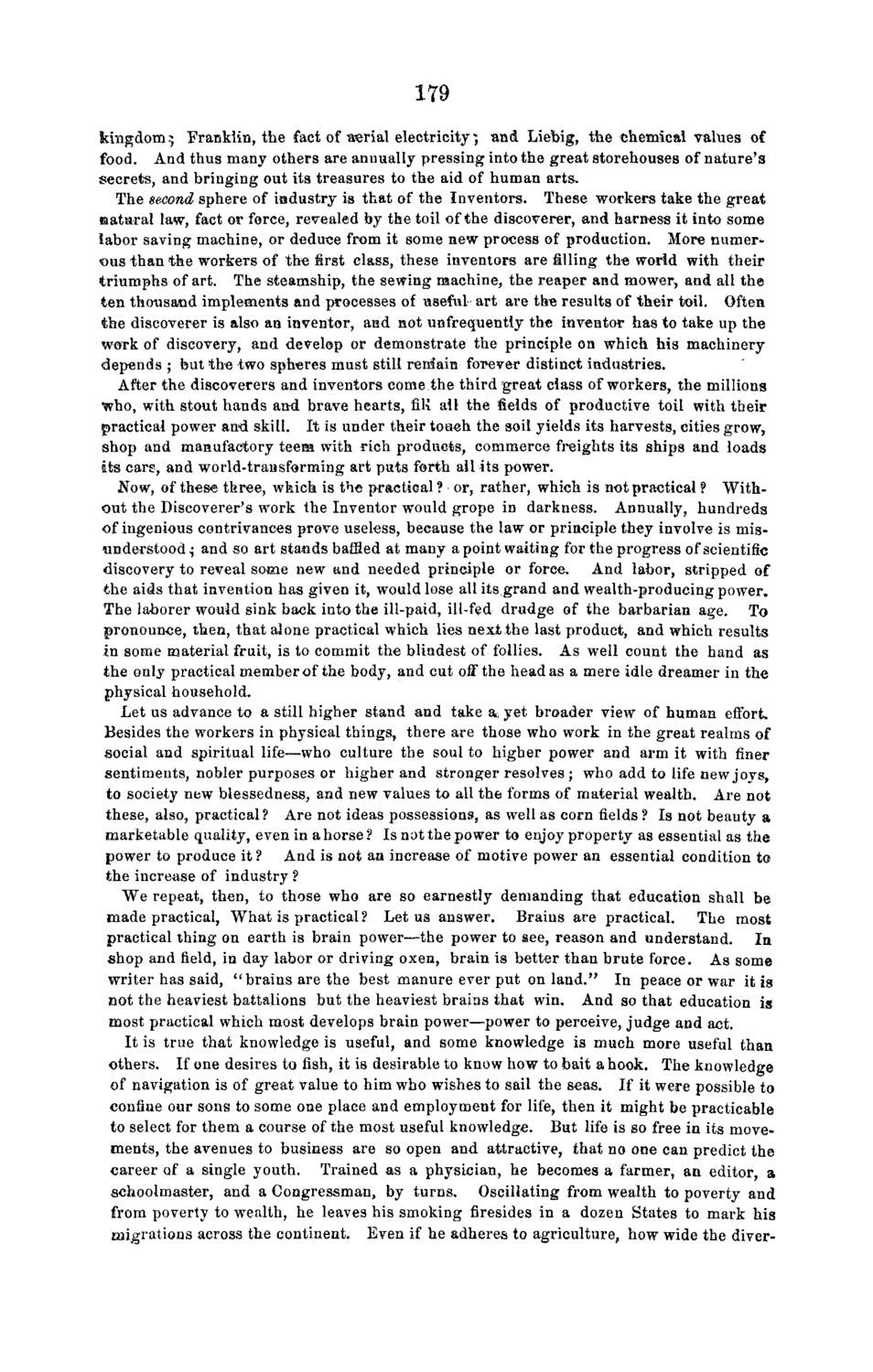| |
| |
Caption: Board of Trustees Minutes - 1868
This is a reduced-resolution page image for fast online browsing.

EXTRACTED TEXT FROM PAGE:
179 kingdom ?, Franklin, the fact of aerial electricity; and Liebig, the chemical values of food. And thus many others are anuually pressing into the great storehouses of nature's secrets, and bringing out its treasures to the aid of human arts. The second sphere of industry is that of the Inventors. These workers take the great taataral law, fact or force, revealed by the toil of the discoverer, and harness it into some labor saving machine, or deduce from it some new process of production. More numerous t h a n the workers of the first class, these inventors are filling the world with their triumphs of art. The steamship, the sewing machine, the reaper and mower, and all the ten thousand implements and processes of useful art are the results of their toil. Often the discoverer is also an inventor, and not unfrequently the inventor has to take up the work of discovery, and develop or demonstrate the principle on which his machinery depends ; but the two spheres must still rerrfain forever distinct industries. After the discoverers and inventors come the third great class of workers, the millions who, with stout hands and brave hearts, fill all the fields of productive toil with their practical power and skill. It is under their touch the soil yields its harvests, cities grow, shop and manufactory teem with rich products, commerce freights its ships and loads its care, and world-transforming art puts forth all i t s power. Now, of these three, which is the practical? or, rather, which is not practical ? Without the Discoverer's work the Inventor would grope in darkness. Annually, hundreds of ingenious contrivances prove useless, because the law or principle they involve is misunderstood,; and so art stands baffled at many a point waiting for the progress of scientific discovery to reveal some new and needed principle or force. And labor, stripped of the aids that invention has given it, would lose all its grand and wealth-producing power. The laborer would sink back into the ill-paid, ill-fed drudge of the barbarian age. To pronounce, then, that alone practical which lies next-the last product, and which results in some material fruit, is to commit the blindest of follies. As well count the hand as the only practical member of the body, and cut off the head as a mere idle dreamer in the physical household. Let us advance to a still higher stand and take a* yet broader view of human effort. Besides the workers in physical things, there are those who work in the great realms of social and spiritual life—who culture the soul to higher power and arm it with finer sentiments, nobler purposes or higher and stronger resolves ; who add to life new joys, to society new blessedness, and new values to all the forms of material wealth. Are not these, also, practical? Are not ideas possessions, as well as corn fields ? Is not beauty a marketable quality, even in a horse ? Is not the power to enjoy property as essential as the power to produce it? And is not an increase of motive power an essential condition to the increase of industry ? W e repeat, then, to those who are so earnestly demanding that education shall be made practical, What is practical? Let us answer. Brains are practical. The most practical thing on earth is brain power—the power to see, reason and understand. In shop and field, in day labor or driving oxen, brain is better than brute force. As some writer has said, " brains are the best manure ever put on land." In peace or war it is not the heaviest battalions but the heaviest brains that win. And so that education is most practical which most develops brain power—power to perceive, judge and act. It is true that knowledge is useful, and some knowledge is much more useful than others. If one desires to fish, it is desirable to know how to bait a hook. The knowledge of navigation is of great value to him who wishes to sail the seas. If it were possible to confine our sons to some one place and employment for life, then it might be practicable to select for them a course of the most useful knowledge. But life is so free in its movements, the avenues to business are so open and attractive, that no one can predict the career of a single youth. Trained as a physician, he becomes a farmer, an editor, a schoolmaster, and a Congressman, by turns. Oscillating from wealth to poverty and from poverty to wealth, he leaves his smoking firesides in a dozen States to mark his migrations across the continent. Even if he adheres to agriculture, how wide the diver-
| |